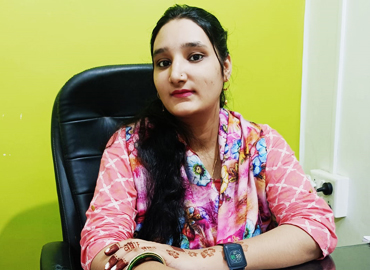Diabetes is a long-lasting (chronic) disease in which glucose (sugar) is abundant in the blood. Diet4U Wellness suggests a diabetic diet plan. Read further to understand diabetes in easy language. With knowledge, we can together put up a good fight against diabetes with the help of our diabetes diet.
When you eat, your body converts what you consume into sugar, and the hormone insulin facilitates the entry of glucose into your cells. The body of a person with diabetes, however, either produces insufficient insulin or is unable to utilize sugar effectively. Because of this, the sugar is kept in circulation and cannot enter the cells. If left untreated, this might result in excessive sugar levels in the blood, which could harm various body components. Some of the signs of diabetes are constant hunger, thirst, fatigue, frequent trips to the toilet, and unintentional weight loss.
Types of Diabetes
Diabetes is categorized into two primary varieties: Type one and Type two.
When the body doesn't produce enough insulin, type one diabetes develops and is typically diagnosed in childhood or young adulthood.
Diabetes of type 2 diabetes is more prevalent and typically affects fat or overweight people. The body can still produce insulin in diabetes of type two, but it doesn't function as well as it could.
Medication, dietary adjustments, regular exercise, and blood sugar level monitoring are all effective ways to control diabetes. If you suspect you may have diabetes, it's crucial to consult a doctor so they can diagnose you and develop a treatment plan.
Significance of our dietitian's role and diabetic diet plan
Dietitians are extremely important in the treatment of diabetes. Diabetes is a long-term illness that interferes with the body's ability to metabolize glucose, a form of sugar that serves as the body's primary fuel source. A person with diabetes has either ineffective production of the hormone insulin, which helps control blood sugar levels, or inefficient utilization of it. As a result, to control their blood sugar levels, patients must constantly watch their food and lifestyle. A dietitian may assist people with diabetes in creating a personalized diabetic diet plan that considers their unique requirements, way of life, and personal preferences. They can suggest what foods to consume, how much to eat each meal, and when. They can also provide tips on how to choose healthier meals.
Dietitians' education and support services for people with diabetes can help them better understand how a proper diabetic diet plan affects blood sugar levels. They can instruct them on the appropriate usage of nutrition labels, meal preparation, and carbohydrate management. In addition, our dietitians may advise making better choices when consuming or going to celebrations for individuals with diabetes. They can also help individuals who have diabetes negotiate social settings.
Our dietitians will play a critical role in helping people with diabetes manage their illness successfully, lower their risk of issues, and enhance their standard of life.
Diabetes: Causes, risk factors, and symptoms
Diabetes is a chronic illness that impacts the body's ability to handle glucose (blood sugar). The two most common kinds of diabetes are type 1 and type 2. The body's immune system targets and kills the pancreas's insulin-producing cells. Type 1 diabetes is assumed to be brought on by a confluence of hereditary and environmental factors; however, its specific etiology is unknown.
The most prevalent kind of diabetes, type 2, develops when the body stops producing enough insulin to keep blood sugar levels within a normal range or when the body develops insulin resistance. Type 2 diabetes is at risk for the following:
1. Having a close relative who has type 2 diabetes raises the risk.
2. A significant risk element for diabetes type 2 is being overweight or obese because excess body fat might make it more difficult for the body to utilize insulin as intended.
3. Type 2 diabetes risk might rise when physical activity levels are low.
4. Type 2 diabetes is more likely to develop in those who have high blood pressure.
5. Type 2 diabetes risk can be raised by having high LDL (low-density lipoprotein) or bad cholesterol and lower HDL (good) cholesterol levels.
6. The chance of having type 2 diabetes rises as individuals turn older, especially around age 45.
7. Women who acquire gestational diabetes while pregnant are at higher risk of getting type 2 diabetes in the later part of life. Call Diet4u Wellness to consult about a diabetes diet!
Symptoms
1. Diabetes patients may have increased thirst and urination needs.
2. Diabetes frequently manifests as weariness, significantly when blood sugar scales are elevated.
3. Vision might become blurry due to swelling of the eye's lens brought on by high blood sugar levels.
4. High blood sugar levels might hinder the body's capacity to recover from injuries and illnesses.
5. Nerve damage brought on by high blood sugar levels might cause numbness in the limbs.
6. Due to the body using fat and muscle for energy, individuals who have diabetes (type 1) may also suffer unexplained weight loss.
7. Individuals with diabetes (type 2) may feel hungrier because their bodies have a more challenging time using insulin effectively.
8. Dry lips and skin are two symptoms of high blood sugar.
It's significant to remember that some type 2 diabetics may first have no symptoms or very minor symptoms that go undiagnosed. To screen for diabetes, it is crucial to have routine physicals and blood testing.
What if you ignore our professional diabetic diet plan?
Uncontrolled diabetes can eventually cause a range of significant health issues because elevated blood sugar levels can harm different bodily organs and systems. Here are a few typical side effects of uncontrolled diabetes:
1. The health hazards of stroke, heart disease, and many other cardiovascular issues might arise due to high blood sugar levels, which can also harm blood vessels. Call Diet4U Wellness for the type 1 diabetic diet plan!
2. The hands, feet, and other body areas may experience tingling, numbness, and discomfort due to high blood sugar levels damaging the nerves throughout the body.
3. High blood sugar levels can damage the blood vessels in the eyes, causing visual issues and, in extreme circumstances, blindness.
4. Over time, kidney damage brought on by high levels of blood sugar can result in renal disease and, in extreme situations, kidney failure.
5. High blood sugar levels can harm nerves and impair circulation, increasing the risk of ulcers, diseases, and even limb loss in the feet.
6. High blood sugar levels can make it harder for the immune system to fight off infections, resulting in skin conditions, including bacterial and fungal infections.
7. High blood sugar levels can harm the nerves that regulate the stomach's muscles, delaying gastric emptying and complicating digestion.
8. Both men and women may experience sexual dysfunction as a result of high blood sugar levels damaging the nerves and blood vessels in the vaginal region. Contact us for the Type 2 Diabetes Diet!
It's crucial to treat diabetes effectively to prevent these issues from arising or getting worse. This may entail making lifestyle adjustments, including eating a nutritious diet, working out often, quitting smoking, taking medicine, and keeping a close eye on blood sugar levels.
The Significance of our dietitian's effort in choosing the best foods for people with diabetes!
To control diabetes and avoid complications, developing a diet with diabetic-friendly foods is essential. Here are a few explanations:
1. Consuming a balanced, healthful diet can assist in maintaining stable blood sugar levels and avoid dips and spikes that can result in symptoms and consequences.
2. Eating a nutritious, well-balanced diet can help manage weight, which is crucial for treating and avoiding diabetes.
3. A diabetes-friendly diet should consist mainly of heart-healthy foods, including vegetables, whole grains, fruits, lean meats, and healthy fats.
4. Following a meal plan suited to their condition can help ensure that people with diabetes get the nutrients they require to be healthy.
5. People with diabetes who eat a nutritious, balanced diet can keep their energy levels steady for the whole day, which is crucial for controlling symptoms and staying active.
A dietitian from Diet4U Wellness believes that a perfect diabetic-friendly food plan should include all food categories and emphasize complete, nutritious foods. It should also restrict or avoid sugary refreshments, junk food, and refined carbs that might raise blood sugar levels.
The Significance of physical activities suggested by our dietitians to manage diabetes
To feed your muscles during activity, your body depletes the glucose levels in your blood. Your body's capacity to utilize insulin will be enhanced, which can assist in reducing blood sugar levels. To control diabetes, besides a diabetes diet, our dietitians may suggest a range of physical activities, such as:
1. Walking, cycling, and swimming are examples of aerobic exercise. Aerobic activity helps to raise your respiration and pulse, which in turn enables a body to utilize insulin more effectively.
2. Resistance training is a form of exercise, sometimes called weightlifting training. It helps develop muscle, enhances your body's insulin utilization, and reduces blood sugar levels.
3. High-intensity interval training can increase insulin sensitivity and significantly reduce blood sugar levels.
In addition to suggesting the best foods for diabetics, our dietitian can assist you in creating a personalized workout program that is safe and meets your fitness objectives.
The Significance of lifestyle change mentored by our dietitian to control diabetes
A dietitian's guidance in making lifestyle adjustments can be very helpful in managing diabetes. Here are a few explanations:
1. You can better regulate your blood sugar levels by creating a meal plan with a nutritionist that is low in carbs and sugar.
2. Depending on your goals, a dietitian could help you create a wholesome eating schedule that encourages weight reduction or management.
3. A dietitian can help you create a heart-healthy eating regimen that lowers your chance of developing heart disease.
4. Diabetes that is not managed correctly can cause several issues, including nerve damage, renal illness, and eye issues. You can create a diabetic meal plan that lessens the likelihood of these issues with the assistance of a nutritionist.
5. A nutritionist can help you create a food plan that provides the proper nutrients to increase your energy levels.
Making lifestyle changes under the guidance of a dietician can improve your diabetes management and lower your risk of complications. Working together with a dietitian, you can create a specialized plan tailored to your specific requirements and objectives.
The Significance of a routine check-up of glucose levels in the blood suggested by our dietitian
For those who have diabetes, routine blood glucose checks are crucial. Here are a few explanations:
1. People who get regular check-ups could monitor their blood sugar levels and, if necessary, modify their medication, food, and exercise regimens.
2. Regularly checking levels of blood sugar could aid in spotting diabetic consequences early on, including nerve damage, kidney illness, and eye issues. These issues can be prevented from worsening by seeking treatment and early identification.
3. Regular check-ups can help identify if a person's current dosage is adequate or whether adjustments are required if they are taking diabetic medication.
4. Regular check-ups can assist patients and their medical professionals in assessing the effects of lifestyle modifications, such as dietary and activity modifications, on blood sugar levels.
5. Regular exams can inspire and support people in maintaining good routines and successfully controlling their diabetes.
Besides a diabetes diet plan for those with diabetes, routine blood glucose checks are crucial. They offer practical knowledge that may be used to control diabetes and avert complications properly.
Conclusion
It is impossible to underestimate the value of dietitian-led diabetic care. A dietitian may assist people with diabetes in adequately managing their type 1 or type 2 diabetes diet and illness by offering personalized nutritional education, accountability, a diabetic diet plan, and inspiration. Additionally, they may check blood sugar levels, change medication doses, address any impediments and problems, and offer continuing support and follow-up.
- Treatment from a dietitian can help people with diabetes better manage glucose levels in their blood and maintain a healthy weight, lower their risk of complications, and generally enhance their health and quality of life. Working closely with a dietician to create a personalized plan that addresses their particular requirements and goals is crucial for people with diabetes.






